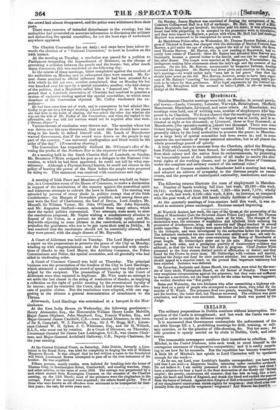b Vrobintes.
Simultaneous Chartist meetings were held, on Monday, in several provin- cial towns,—Leeds, Coventry, Leicester, Warwick, Birmingham, Sheffield, Manchester, Blackburn, Liverpool, and some others. At Manchester, two meetings were held, one of working men, another of shopkeepers who hap- pened to be Chartists. We do not observe that the meetings were anywhere on a scale of extraordinary magnitude: the largest was at Leeds, and is es- timated at eight or ten thousand; at Liverpool, three or four thousand; at Manchester, [the operative meeting.) about two thousand. There was some violent language, but nothing of a very unusual kind. Precautions were generally taken by the local authorities to preserve the peace: in Manches- ter a large body of special constables had been sworn in; and in some quarters the movements of troops attracted attention; but in all places the whole proceedings passed off quietly. A body which seems to emanate from the Chartists, called the Birming- ham Political Council, has been formed, for redeeming the working classes from their misery and the nation from its embarrassments, by promoting "an honourable union of the industrious of all ranks to secure the elec- toral rights of the working classes, and to place the House of Commons under the complete and salutary control of the national voice."
A number of German residents in Manchester held a meeting last week, and adopted an address of sympathy to the German people on recent events, and the prospect of emancipated nationality, institutions, and com- merce.
The following returns illustrate the state of employment in Manches- ter. Number of hands working full time last week, 29,195—this week, 29,115; working short time, last week, 7,323—this week, 7,170; wholly out of work, last week, 8,120—this week, 8,404; an increase, as compared. with the past week, of about 300 hands totally destitute of employment.
At the quarterly meetings of iron-masters held this week, it was re- solved to maintain prices unchanged. Business seemed improving.
At Warwick Assizes, last week, the case of the Queen at the prosecution of the Bishop of Manchester (late the Reverend James Prince Lee) against Mr. Thomas Gutteridge, a surgeon at Birmingham, came on for trial. The charges of the declaration were, the utterance of scandalous and injurious libels accusing the prosecutor of drunkenness, lying, and unworthy and • illegal conduct in several public capacities. These charges were made before the late elevation of Dr. Leo to the bishopric, and were investigated by the authorities before his promotion. The defendant conducted his own cause with some ability and tact, not only de- livering a long speech, but also cross-examining the Bishop of Manchester at great length. Mr. Gutteridge's sister sat by his side. Many witnesses were called on both sides, and a prodigious quantity of documentary evidence was adduced; so that the trial was four fall days in progress. Chief Justice Wilds presented to the Jury sixteen distinct points of affirmation or denial; and they found for the Crown on every issue. Mr. Gutteridge, with coolness and suavity, thanked the Judge and Jury for their patient attention, but announced that he should appeal to a superior court, on the ground that important testimony had been rejected. Sentence was deferred.
On Saturday, Benjamin and James Hazel!, two youths, were tried for the mar- der of their uncle, Walsiugham Huai, an old farmer of Dundry. There were very suspicions circumstances against the prisoners; but they were not sufficient to warrant a conviction, not the least motive for the crime having been suggested; the verdict therefore was "Not guilty."
Bates and Walinsley, the two Irishmen who after committing a highway rob- bery fired on a party of people who attempted to arrest them, were tried for the murder of W. Wyatt. The prisoners fired two pistols, wounding Thomas Wyatt and his brother; the latter died, but Thomas recovered. The evidence was quite conclusive, and the men were convicted. Sentence of death was passed by the Judge.


























 Previous page
Previous page